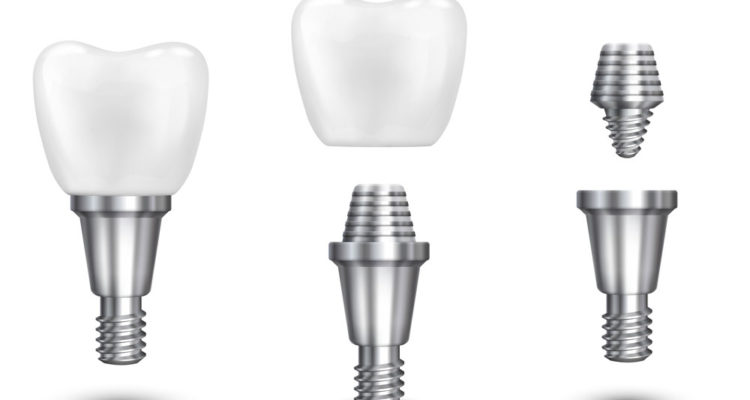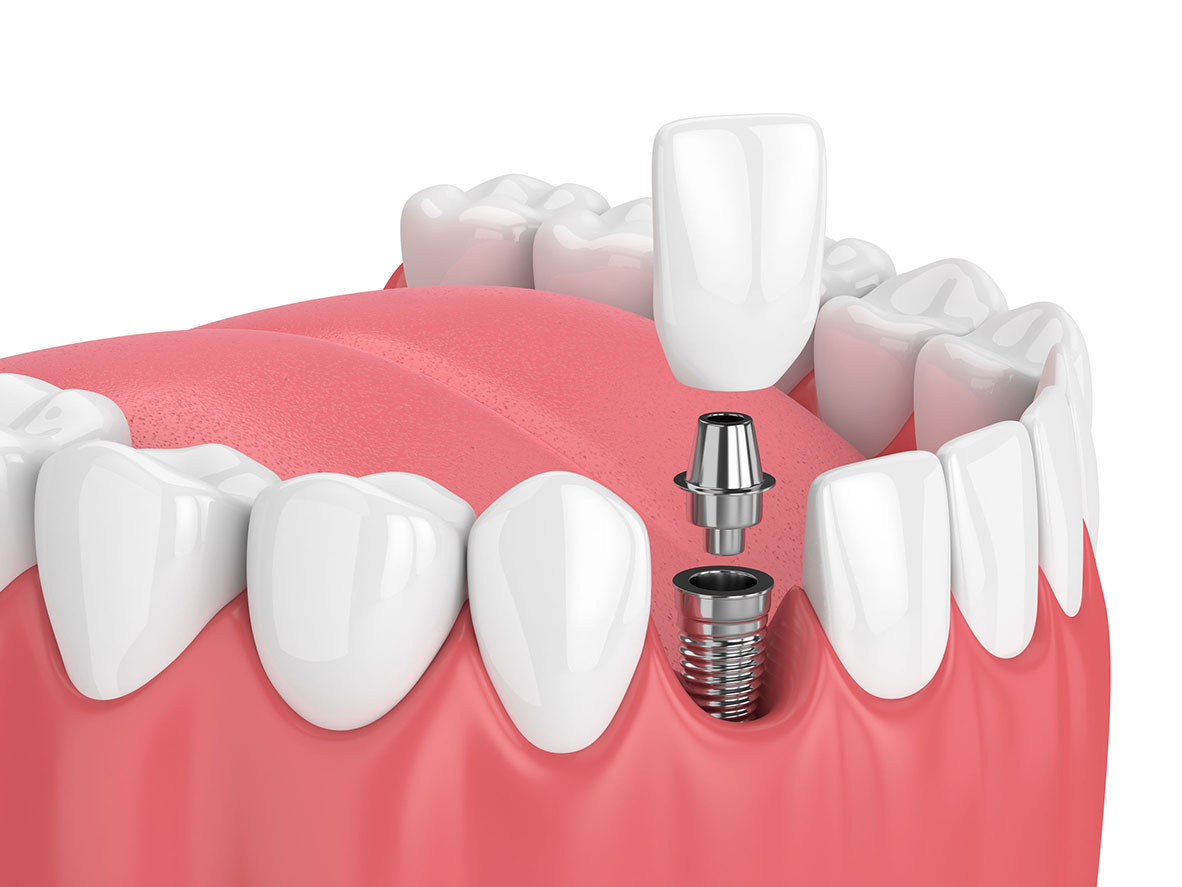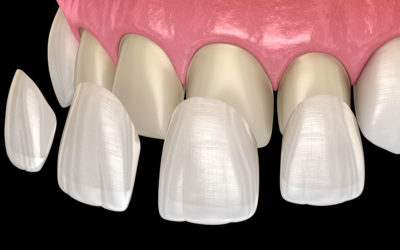
Dental implant or bridge: which is best for you?
The loss of one or more teeth can have a significant impact on your quality of life, affecting your ability to eat, speak and smile with confidence. Fortunately, modern dentistry offers several solutions for replacing missing teeth, among which dental implants and bridges are the most common and effective options.
Choosing between these two treatments can be complex, as each has specific advantages and disadvantages. This article aims to provide you with a comprehensive guide to help you understand the differences between a dental implant and a bridge, so that you can make an informed decision in collaboration with your dentist.
Understanding dental implants: a sustainable, self-sufficient solution
A dental implant is an artificial root, usually made of titanium, which is surgically inserted into the jawbone below the gum line. Once the implant is integrated into the bone (a process called osseointegration, which can take several months), it serves as a solid support for an artificial crown, bridge or denture.
Advantages of dental implants
- Durability and longevity: With proper care, a dental implant can last for many years, even a lifetime. Titanium is a biocompatible material that fuses with bone, providing an extremely stable base.
- Preservation of jawbone: Unlike bridges, implants stimulate the jawbone, helping to prevent the bone resorption that occurs after tooth loss. This bone preservation is crucial to maintaining facial structure and avoiding long-term facial sagging.
- Function and Comfort Similar to a Natural Tooth : A well-integrated dental implant feels and functions very much like a natural tooth. You can eat, speak and smile without worrying about the stability of your prosthesis.
- Independence of neighboring teeth: The installation of an implant does not require modification of adjacent teeth, unlike a bridge, which relies on the support of these teeth. This preserves the integrity of healthy teeth.
- Natural esthetics: The crown that is attached to the implant is designed to resemble a natural tooth, blending in perfectly with your smile.
- Ease of maintenance: The maintenance of an implant is similar to that of a natural tooth, requiring regular brushing, flossing and dental check-ups.
Disadvantages of dental implants
- Higher cost: A dental implant is generally more expensive than a bridge, as it involves surgery and several steps.
- Longer process: The implant installation process, from initial surgery to crown placement, can take several months due to the time required for osseointegration.
- Requires good general and oral health: To be a good candidate for a dental implant, you must have good general health and sufficient bone density in the jaw to support the implant. Certain medical conditions and smoking can compromise implant success.
- Surgical risks: As with any surgical procedure, implant placement carries risks, although generally low, such as infection, nerve damage or sinus problems.

Exploring dental bridges: a classic, fast solution
A dental bridge is a fixed prosthesis that replaces one or more missing teeth by resting on adjacent 1 healthy teeth, called abutments. The bridge consists of one or more false teeth (pontics) held in place by crowns that are cemented onto the abutment teeth.
Advantages of dental bridges
- Lower cost: A bridge is generally less expensive than a dental implant, which can be an important factor for some patients.
- Faster process: Fitting a bridge is a faster process than an implant, typically requiring two to three visits to the dentist over a period of a few weeks.
- Less invasive than implants: Bridgework does not require invasive jawbone surgery.
- Potential reimbursement: In some cases, bridges can be partially reimbursed by the health insurance system, which can reduce the total cost to the patient.
Disadvantages of dental bridges
- Requires modification of abutment teeth: To fit a bridge, it's necessary to trim the abutment teeth so that they can support the crowns. This means sacrificing some of the healthy enamel on these teeth, which can weaken them and make them more susceptible to cavities or gum problems in the long term.
- Does not preserve the jawbone: A bridge does not stimulate the jawbone beneath the missing tooth, which can lead to progressive bone resorption.
- Less durable than implants: Although a bridge can last for many years, its lifespan is generally shorter than that of a dental implant, and it may eventually need to be replaced.
- Difficulty of cleaning: It can be more difficult to clean properly under a bridge, which increases the risk of cavities on abutment teeth and gum problems. The use of interdental brushes or special dental floss is essential.
- Potential aesthetic impact: If the abutment teeth are highly visible, the presence of crowns can sometimes have an aesthetic impact, although modern techniques make it possible to create very discreet crowns.
How do I choose between a dental implant and a bridge?
The choice between a dental implant and a bridge depends on a number of individual factors, which you should discuss with your dentist. Here are some key elements to consider:
- Your general and oral health: Your general health, jawbone density and oral hygiene are important factors in determining whether you are a good candidate for a dental implant.
- The number of missing teeth: Implants are particularly suitable for replacing a single missing tooth or several non-adjacent teeth. Bridges are more commonly used to replace one or more adjacent teeth.
- Condition of neighboring teeth: If the teeth adjacent to the edentulous space are healthy and strong, an implant may be a better option to avoid modifying them. If these teeth are already weakened or require crowns, a bridge may be a more appropriate solution.
- Cost: Budget is an important factor for many patients. The higher cost of implants can be a deterrent for some, while bridgework represents a more affordable option in the short term.
- Time: If you're looking for a quicker solution, a bridge is generally quicker than an implant.
- Your Personal Preferences: Your preference for a more durable, self-contained solution (implant) or a less invasive option (bridge) may also influence your decision.
Dental implant or bridge? Contact Centre Dentaire Champel
Choosing between a dental implant and a bridge is an important decision that should be made in consultation with your dentist. Each option has advantages and disadvantages, and the best solution for you will depend on your specific situation, your oral health, your goals and your budget.
Don't hesitate to ask your dentist any questions you may have, and discuss the advantages and disadvantages of each option in detail. He or she will be able to assess your personal situation and recommend the most suitable solution to restore your smile and functionality in a lasting and satisfying way.
Discover also the Centre Dentaire Lancy and the Centre Dentaire Chêne-Bourg





